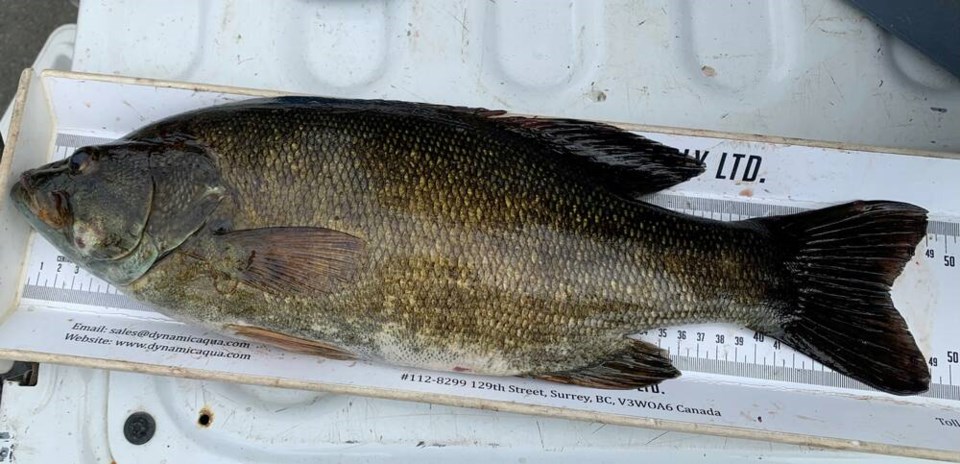The province will start setting gill nets and using “electrofishing” in Echo Lake near Campbell River this month in an attempt to eradicate an invasive sports fish.
Anglers are also urged to cast their lines to catch as many smallmouth bass as possible, freeze their catches and report them to fisheries officials.
Smallmouth bass were introduced into the lake recently and prey heavily on smaller trout and other fish, said Sarah Unrau, a biologist for the A-Tlegay Fisheries Society, a collaboration of five area First Nations that is assisting the province in the eradication effort.
Unrau said it isn’t known how many of the small mouth bass are in Echo Lake, about 15 minutes from Campbell River along the Gold River Highway.
But she said there is concern the bass could make their way to the nearby Campbell River watershed and damage populations of trout and salmon.
The ministry said smallmouth bass, which can out-compete native fish species, were introduced illegally into Echo Lake.
Provincial biologists conducted monitoring and eradication of the fish from June to October last year, via gill netting and electrofishing — using electrical current to stun and kill the fish — in collaboration with the B.C. Conservation Foundation.
Monitoring and eradication work will continue from now until October, in co-operation with A‑Tlegay Fisheries Society, which will provide snorkeling divers and other assistance, Unrau said.
Anglers fishing Echo Lake during the next few months and are asked to freeze and report any smallmouth bass caught to FrontCounterBC.
The province said moving live fish, including smallmouth bass, between water bodies is illegal and can result in fines of as much as $100,000 for a first-time offences or a prison term as long as 12 months under the Wildlife Act and Freshwater Fishing Regulation. For second offences, the fine and prison time are doubled.
Fishers are encouraged to report any information regarding the illegal movement of species in B.C. to the Report All Poachers and Polluters (RAPP) 24-hour hotline. A cash reward of as much as $2,000 through the B.C. Wildlife Federation may be available for reporting any information that leads to a conviction.
The Invasive Species Council of B.C. said smallmouth bass, also called bronzeback and brown bass, are native to eastern and central North America, but have been introduced into B.C. waterways, including in the Okanagan, Kootenays, Thompson and Cariboo regions, as well as several other lakes on Vancouver Island.
According to Island Fisherman Magazine, several lakes on the Island hold populations of smallmouth bass, including Elk and Beaver lakes, Langford and Glen lakes, Shawnigan Lake and Fuller Lake, south of Chemainus.
Female smallmouth bass can spawn several times in a year, if water temperatures stay above 15 C, and can produce up to 10,000 eggs each time.
They also feed on amphibians and aquatic insects, according to the Invasive Species Council of B.C.
Smallmouth bass are designated as a management species on the provincial priority invasive species list.



